I love easing myself into a hot springs soothing, healing, deliciously toasty
waters. I’ve found solace and relief in remote hot springs, but I also
appreciate more upscale settings, where a post-soak dinner seems even tastier
and nestling into a feathery bed is like sleeping on a cloud.
 |
|
|
Soothing soaking at Summer Lake
|
The result has been a search for the perfect soak, visits to hot springs resorts
fancy, classy and sassy. Resorts where before or after, or better, before and
after a soak, I could be spoiled. Resorts where, when I departed, my leaving
was with genuine regret.
The Pacific Northwest is sprinkled with hot springs resorts, some plain, some
fancy. It will probably take years to find the perfect soak. But a lot of the
fun is in the searching. Following are some of the possibilities.
Lava Hot Springs
For some searchers, the quest might end at Lava Hot Springs in eastern Idaho.
The city and its hot springs have lured soakers for generations, from American
Indians to early 1900s settlers to the 145,000 or so happy bathers who make
annual pilgrimages. Lava Hot Springs is an easy 11-mile drive from Interstate
15, making it a convenient stop for tourists traveling to or from Jackson Hole
or Yellowstone National Park.
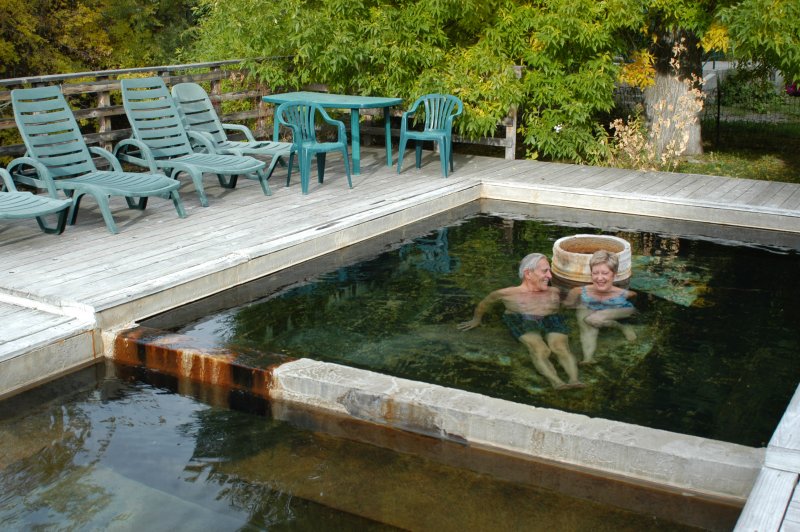 |
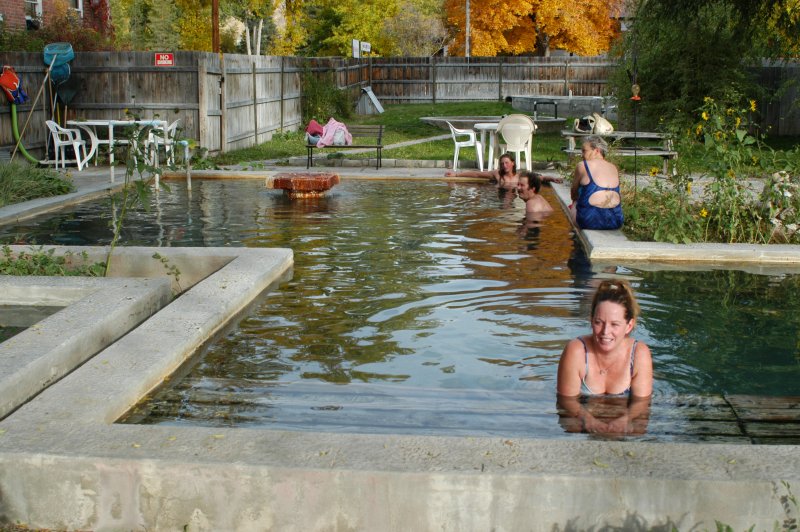 |
|
Relaxing at Hot Springs Inn
|
Come on in
|
Saturday night is regarded as date night because the pools are especially popular
with college couples. My only date was with a sunset soak. Before that, I stopped
at the Lava Hot Springs Inn, a hospital built in 1927. It's now a 27-room bed
and breakfast, some with jetted hot springs heated tubs that its managers say
attracts the unpretentious. I was told the town, and Inn, appeal to people who
are relaxed. When Lava Hot Springs residents say the city is “50 years
behind times,” they aren’t complaining.
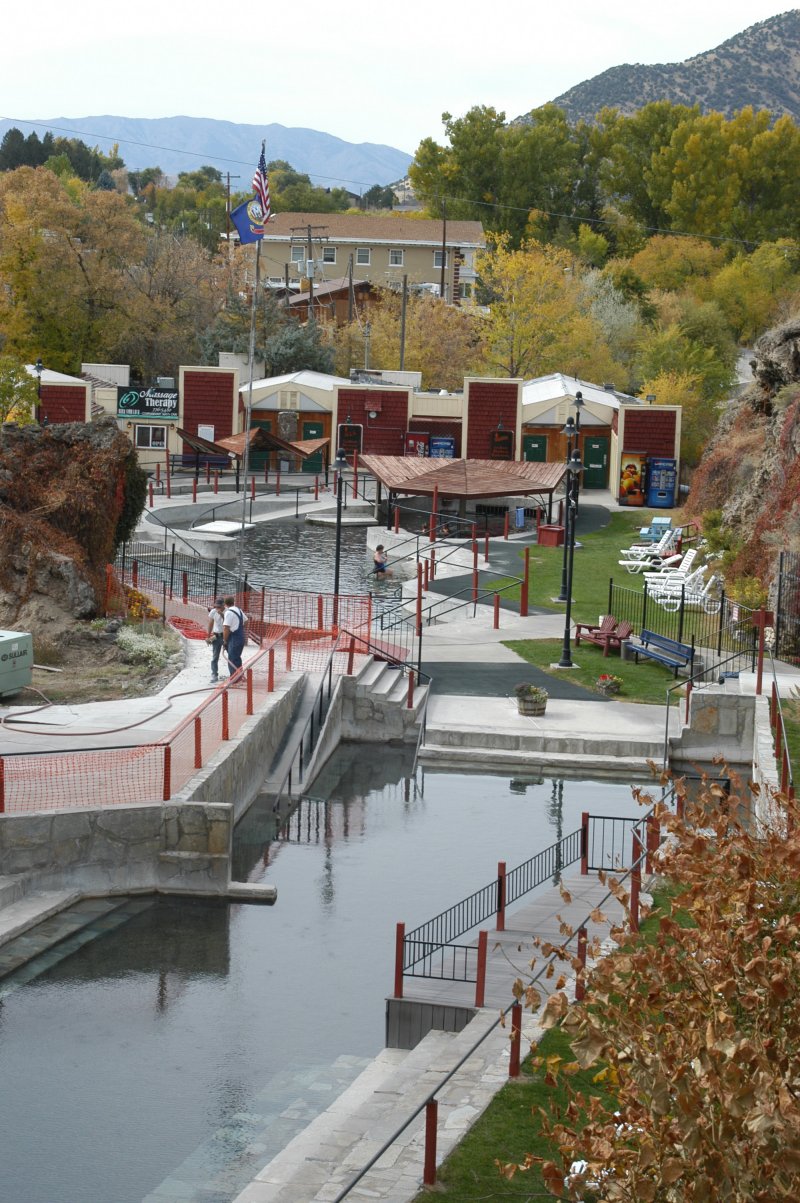 |
 |
Soakers have their choice of two hot pools in front of the hotel and, out back,
three more. The L-shaped pool, out back, is too roasty for swimming. At 106
degrees it made my arms and legs feel like jelly. Just steps away, another longer
pool was several degrees cooler, so I lapped it up. The third felt hot enough
to boil eggs.
I visited the town museum, where exhibits feature hot springs displays, including
old hot springs-issue baggy swimsuits. Land for the town was removed from the
Fort Hall Indian Reservation and transferred to the state of Idaho, which manages
the hot springs.
That evening I joined Lava Hot Springs regulars at the natural hot springs,
where the sulphur-free water are 112 degrees at the source where it bubbles
into the upper pool. Each day 2-1/2 million gallons of water channel through
two long pools, gradually cooling to more bearable temperatures, before discharging
into the Portneuf River. In the summer, hot springs visitors jump in the Portneuf
and float downstream to a Olympic swimming pool complex, which has two heated
swimming pools, a diving tower, hydrotubes and splash pools.
Summer Lake Hot Springs
First impressions are deceiving. From the outside, the Summer Lake Hot Springs
in southeastern Oregon isn't especially enticing. The bathhouse is inside a
rickety barn. Built in 1927, it could be mistaken for an over-sized chicken
coop. The interior is funky, too. The 15- by 30-foot cement pool is flanked
on two sides by compact dressing rooms and, between the two entrance doors to
"Women's" and "Other," a pair of showers that spit out hot
water only when the pump grumbles into operation.
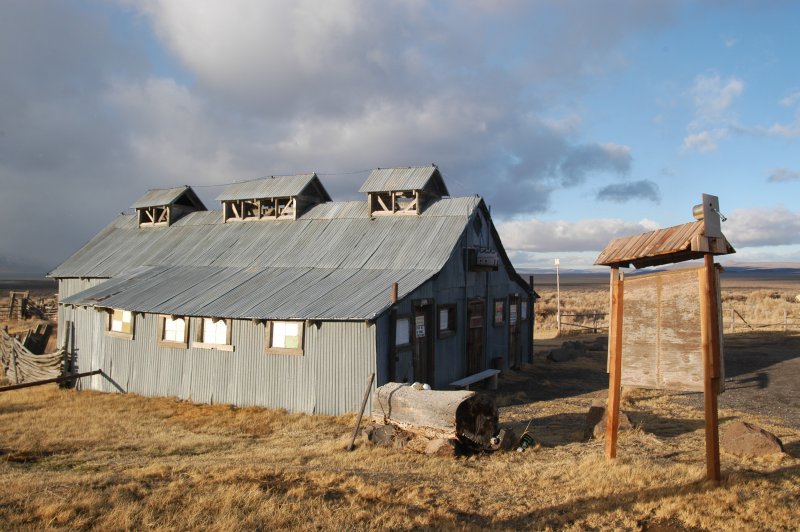 |
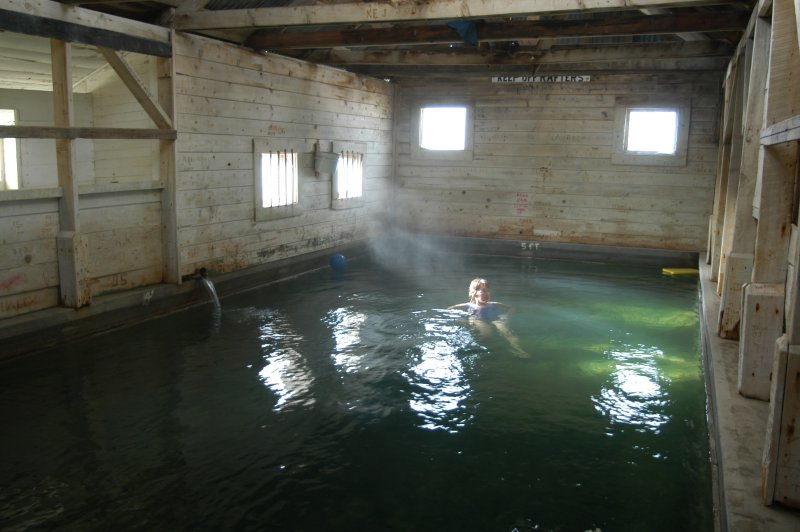 |
|
Bathhouse from the house
|
And inside
|
But slip in the soothing water and everything changes. Early American Indians
knew the area as "medicine springs." Archeological evidence indicates
the hot springs areas have been inhabited for at least 9,000 years. Early settlers
and cowboys have used the springs since the late 1800s. Cowboys from nearby
ranches — the hot springs are located about six miles north of Paisley
off Highway 31 — used the 100 degrees-plus water to shave, bathe and do
laundry in the 113 degrees water. In 1904, before the bathhouse, it was known
as Woodward Springs for its early owners, Jonas and Lizzie Woodward and cost
10 to 15 cents a swim.
Its current owners intend to retain the rustic flavor while gradually improving
amenities. Long-range plans could include an outdoor pond. The bathhouse’s
architectural has been described as incidental architecture because “you
can't design or build that kind of building.” During one of my visits,
winds gusting at an estimated 70 mph indeed buffeted the bathhouse, with blasts
crashing like smashing waves. It was noisy but secure. Once a week the pool
is drained, scrubbed, hosed down and brushed before being refilled.
After every visit, I feel revived, and refilled with energy.
Givins Hot Springs
Givens Hot Springs in southwestern Idaho is traveling back in time. The "new"
poolhouse was built in 1952 while the restrooms, dressing rooms and facilities
are basic and functional. Nothing is fancy. Givens Hot Springs is no trendy
five-star resort.
Actually, my thoughts changed after a swim-float-rest in the 30- by 80-foot
hot springs heated pool. I've been in many hot springs, but never one that left
me feeling so la-de-dah, with a looking-at-the-world through rose-colored glasses
view of life. Life was lovely, like a sunny-side up egg.
That's the magic of "taking the cure" at Givens Hot Springs. Givens
has long been a favored soaking spot. Prehistoric campsites show the earliest
users came 4,500 years ago. Indians used it as a winter village site. Oregon
Trail travelers found relief here. Two early pioneers, Milford and Mattie Givens,
sampled the 95 to 100 degrees waters in 1879 and developed a resort two years
later. Milford and Mattie, with the help of their sons, built the first hot
springs, which included private rooms with soaking tubs. A hotel, including
a restaurant, ice cream parlor, picnic grounds and eventually a barbershop and
post office, was added in 1903 for overnight guests.
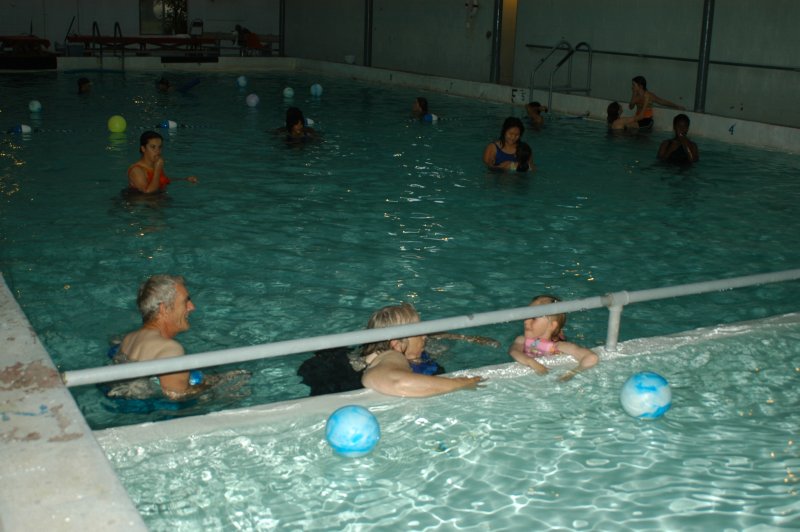 |
|
|
Taking the cure at Givens
|
Located about 40 miles southwest of Boise and about 30 miles from Nampa and
Caldwell, Givens has long been popular. Miners visited from nearby Silver City
while Oregon-bound wagon trains halted so pioneers could soak and refresh themselves.
Years later, there's a steady supply of cure takers. The water comes from a
geothermal spring and well, originally. About 50,000 gallons a day circulate
through the pool and back into the Snake River.
The once bustling resort is a shadow of its past. The hotel burned down in
1939 and was never rebuilt. The original 1903 pool house was replaced in 1952,
and renovated in 1991. Even as some things change, there remains one constant
– Givens incredibly soothing mineral waters.
Belknap Hot Springs
Siloam Springs, The Pools of the Salome, Belknap Hot Springs. It’s been
known by many names, but Belknap is the name that’s stuck. The hot springs
in central Oregon’s Cascades were first tested in 1854 by explorers searching
for the headwaters of the McKenzie River. Commercial use started in 1870 by
Rollin Simeon Belknap, who traveled from Vermont to San Francisco during the
gold rush years, fought in the Rogue River Indian War of 1855 and founded the
hot springs resort, complete with a hotel and bathhouse.
In the 1874 Oregon State Journal, for “Those in Search of HEALTH OR PLEASURE,”
Belknap wrote, “The medicinal properties of the water have been tested
by the cure of those who have visited them who have been afflicted with various
disease, particularly Female Weakness, Scofula, Rheumatism, Inflammation, both
external and internal, and general debility.”
I wasn’t afflicted with any of those debilities, although I confess a weakness
for females, when I visited Belknap. Before soaking I crossed the footbridge
near the lower pool and followed the trail that parallels the McKenzie. An afternoon
soak in the lower pool, just outside the resort’s hotel, massaged weary
lactic acid muscles. Then, just because it’s there, I walked to the upper
pool located amidst cabins and several acres of landscaped gardens.
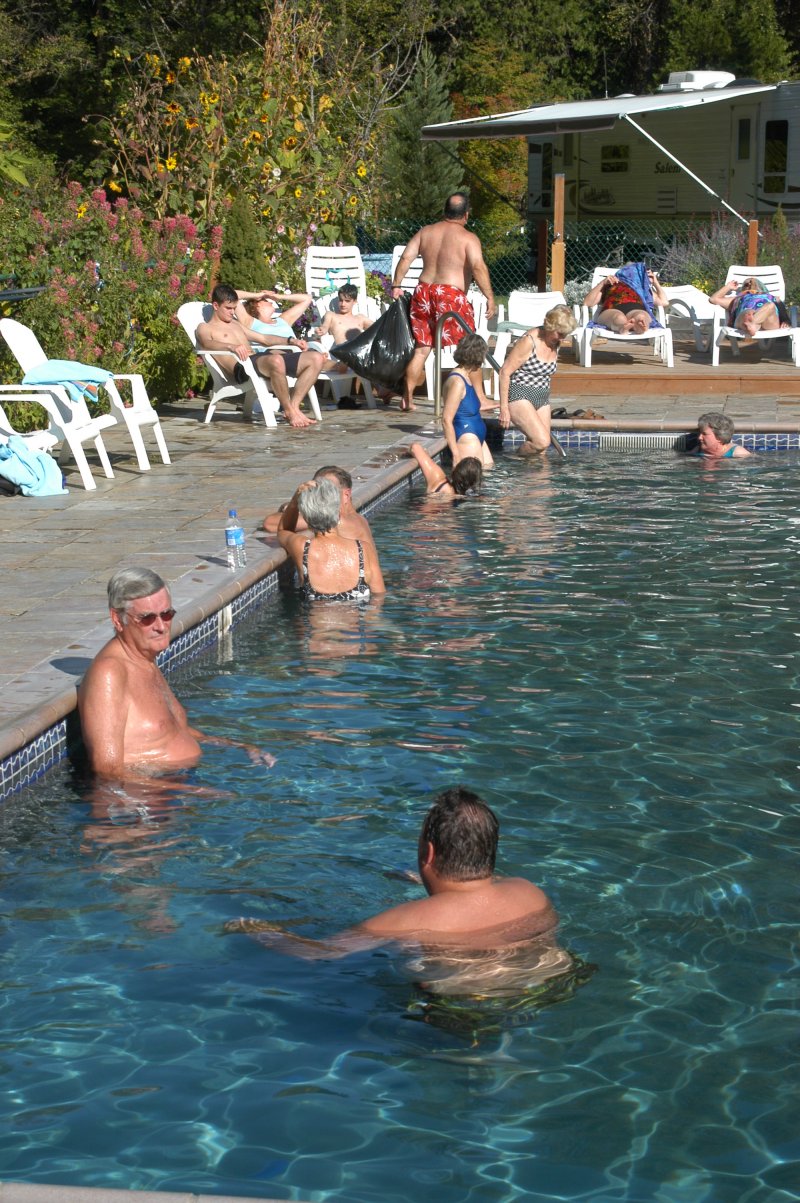 |
|
|
Health and pleasure at Belknap
|
That night after dinner – the resort has no dining facilities so I drove
six miles west on Highway 126 to the community of McKenzie Bridge – I returned
for an evening soak in the lighted lower pool. By the time I collapsed in bed,
I was a most mellow fellow.
Boulder Hot Springs
Sometimes being out of the way is the best way. Boulder Hot Springs is nestled
in the foothills of Montana’s Elkhorn Mountains, about midway between Helena
and Butte. On a busy day Boulder might have 30 to 35 bathers, who have their
choice of soaking and bathing unclothed or in swim suits in two indoor pools
- one for men, another for women- or wearing bathing suits at the outdoor pool.
Both bathhouses have steam rooms.
The geothermal waters that come out of the ground at temperatures of 145 to
170 degrees are piped to indoor and outdoor pools, where they are mixed with
cool spring water. The indoor pools are kept at 104 to 106 degrees while the
outdoor pool is about 98 to 100 degrees.
Boulder Hot Springs is also warmly charming. The resort is located in Peace
Valley, so named because in pre-settlement days warring Indians would honor
truces while visiting the hot springs. The property was claimed in 1881 by a
prospector, James Riley, who built a hotel that had many uses - for “ladies
of the night, ” as a treatment facility for alcoholics, a dude and cattle
ranch and, in 1935, an orphanage. It was also a place for gambling and, during
the big band era, Saturday night dances.
Boulder remains popular with locals year-round while tourists from all over
visit from March through September.
Ongoing rebuilding efforts have upgraded facilities neglected during its ranching
days. The spa buildings, small dining room and east wing, with its 33 “quaint
and comfortable” bed and breakfast style rooms, have been completely refurbished.
Surprise Valley Hot Springs
You could call Surprise Valley Hot Springs far northeastern California’s
Last Resort. Located on Highway 299, just a few miles before the pavement ends
as the road crosses into the sagebrush corner of Nevada.
When the original hot springs resort, Surprise Valley Mineral Wells, was built
in the 1950s by E.E. Rose, it was expected Highway 299 would be full-fledged
paved highway across Surprise Valley, up and over the Hays Mountains and into
Nevada. Rose built a ranch house and hot springs pool, but the hoped-for highway
never happened. For years the Olympic-sized pool was a place where locals came
to swim and soak, but it was filled in the 1980s. Over those decades, the ranch
had only its 205 degrees hot water. In the 1980s, E.E.’s son, Ken, and
his son, Curt, piped in cold water from nearby property and began remodeling
the property, converting it into a series of one-bedroom villas. Each has its
own cascading waterfall of steaming mineral water pouring into individual hot
tubs.
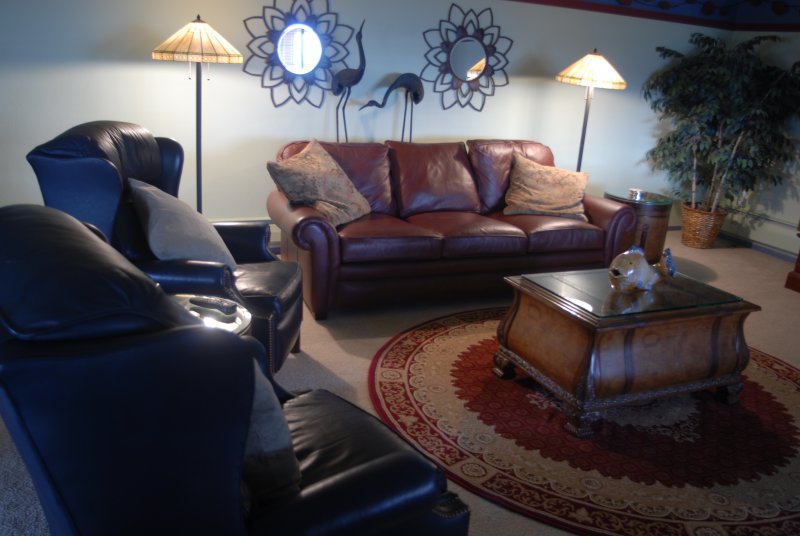 |
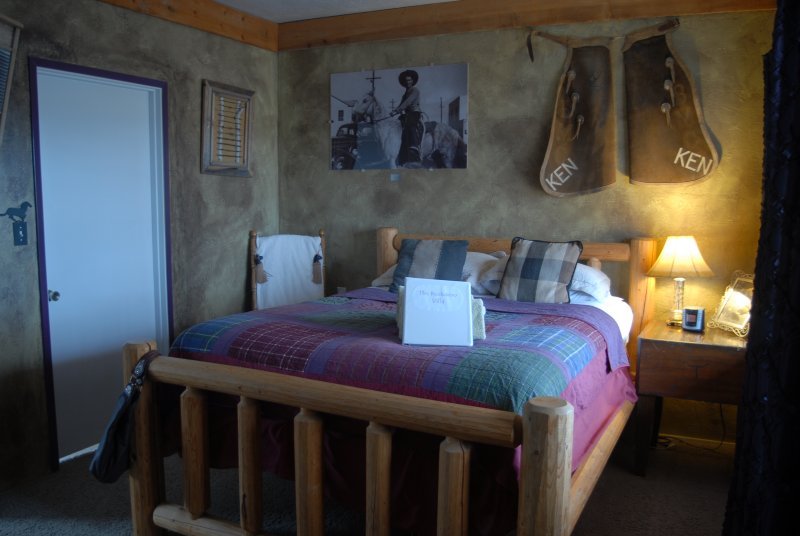 |
The conversion to a hot springs resort began in 1999 with a single room. Over
the years, 16 other rooms – from the standard one-bedroom units with a
bathroom and full or partial kitchen and outdoor hot tub to a newer two-bedroom,
two-bath unit with an indoor hot tub – have been added on.
Despite, and possibly because of its remote location, the hot springs has seen
steady increases in visits, with travelers driving anywhere from an hour or
two to six hours away. Others take advantage of Fly N Soak packages through
the nearby Surprise Valley airport. While the hot tubs are the attraction –
and on a clear night the sight from the hot tub featured a star-studded sky
and the snow-tipped peaks of the raggedly beautiful Warner Mountains –
others combine their private soaks with massages.
Summer is the hot springs busiest season but in winters when the snow is plentiful
some downhill ski or snowboard at the nearby Warner Canyon Ski Area. Others
travel backcountry byways or tour the valley, but most stay close to the hot
springs. They come, as I did, to get away, relax, read, be quiet and - in the
warmth of the hot tubs - to chill out.
Crystal Crane Hot Springs
One foot, then a second. After briefly getting use to the heat, I took a few
steps deeper into the pond, acclimated again, then just sat. It wasn't long
until the searing heat felt soothing, so I took a few strokes and swam toward
deeper water in the large 80-foot diameter pond. As my scorched body adjusted
to the heat, which varies from 95 to a fiery 105 degrees, I rolled and floated
on my back, my eyes taking in the immense, moon-lit sky that was visible through
clouds of heat-generated fog.
During periodic clearings I viewed a sky bulleted with stars, listened to the
yip of howling coyotes and heard the swoosh of Canada geese flying overhead.
A perfect introduction to Crystal Crane Hot Springs.
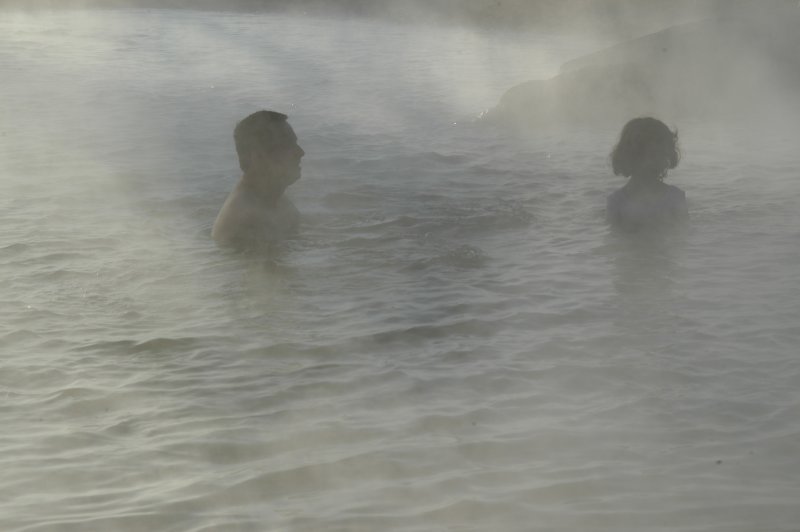 |
|
|
Getting steamed at Crystal Crane
|
Crystal Crane is located 23 miles east of Burns on Highway 78, in southeast
Oregon. It has a large, geothermally heated open pond, rooms with private tubs,
some perfect for one or two people, others large enough for a family of friends.
There’s also a small RV park and campground, 24-hour community kitchen,
and spacious dining-kitchen-television room. It’s not unusual to meet locals,
some in their 80s, who tells of visiting the springs as infants, or from desert
rats, birdwatchers and people exploring the Harney Basin.
Overnighters have free access to the Internet, showers and pond. Private soaking
tubs are rented by the hour. Four tubs are oblong while the larger tubs are
circular. Water temperatures can be adjusted from lukewarm to nearly hot enough
to boil eggs. I like being outdoors, so I stayed in the pond. In the morning
I returned for a second round of bathing.
It was cold outside, but after only a few minutes in the hot springs. I was
warm and toasty. There's more than one way to get soaked.
* * *
Lee Juillerat is the regional editor for the Klamath Falls Herald and News,
author or co-author of books about Crater Lake National Park, and frequent contributor
to a variety of magazines, including Northwest Travel, Oregon Coast, Range and
Horizon and Alaska airlines inflight publications. He can be reached at lee337@cvc.net